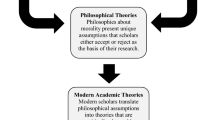Abstract
The cause of ethical failure in organisations often can be traced to their organisational culture and the failure on the part of the leadership to actively promote ethical ideals and practices. This is true of all types of organisations, including the professions, which in recent years have experienced ongoing ethical problems. The questions naturally arise: what sort of professional culture promotes ethical behaviour? How can it be implemented by a profession and engendered in the individual professional? The answers to these questions are of interest to business ethicists since the causes of ethical problems in business are often the same and the professions, as ethically challenged organisations, make useful and informative analogues for the measures to be adopted or avoided when the attempt is made to raise the ethical standards of business.
Given this focus on the professions, it will be argued that the usual, direct attempts to control unethical behaviour by using codes of ethics, legislation and self-regulatory regimes, are not successful.
The answer, it will be argued, lies in using an enforced self-regulation model that aims for ethics indirectly. Such a strategy seeks to develop a goal-orientated professional culture which is actively promoted by the leadership of the profession as well as the members. Specifically, the culture is one that seeks to promote trust in the profession and trustworthiness as a virtue exemplified in each individual. It will be argued that in order to develop a professional culture that cultivates trust a profession will need to develop certain institutions, programs and structures within the profession. I conclude by setting out a model of these trust-cultivating structures.
Similar content being viewed by others
References
Ayres, I. and J. Braithwaite: 1992, Responsive Regulation: Transcending the Regulation Debate (Oxford University Press, New York).
Barber, B.: 1983, The Logic and Limits of Trust (Rutgers University Press, New Brunswick).
Bayles, M. D.: 1989, Professional Ethics (2nd Ed.) (Wadsworth, Belmont).
Beder, S.: 1993 ‘Engineers, Ethics and Etiquette’, New Scientist (25 September), 36–41.
Bowie, N. E.: 1991, ‘Business Ethics as a Discipline: The Search for Legitimacy’, in R. E. Freeman (ed.), (1988) Business Ethics: The State of the Art (Oxford University Press, New York).
Braithwaite, J.: 1982, ‘Enforced Self-Regulation: A New Strategy for Corporate Crime Control’, Michigan Law Review 80, 1466–1507.
Braithwaite, J.: 1989, Crime, Shame and Reintegration (Cambridge University Press, Melbourne).
Braithwaite, J.: 1993, ‘Power and the Architecture of Trust’, Ms photocopy of a paper presented to the Academy of Social Sciences in Australia Symposium, Abuse of Power in Australia, Old Parliament House, 17 November; and Division of Philosophy and Law, Research School of Social Sciences, Australian National University.
Braithwaite, J. and T. Makkai: 1993, ‘Trust and Compliance’, Policing and Society 4, 1–12.
Cullen, J. B.: 1978, The Structure of Professionalism: A Quantitative Examination (Petrocelli Books, New York).
Dasgupta, P.: 1988, ‘Trust as a Commodity’, in D. Gambetta (ed.), Trust: Making and Breaking Cooperative Relations (Blackwell, Oxford), pp. 49–72.
Davis, M.: 1991, ‘Thinking Like an Engineer: The Place of a Code of Ethics in the Practice of a Profession’, Philosophy and Public Affairs 20, 150–167.
Ellin, J. S.: 1982, ‘Special Professional Morality and the Duty of Veracity’, Business and Professional Ethics Journal 1, 75–90.
Gambetta, D.: 1988, ‘Can We Trust Trust?’, in D. Gambetta (ed.), Trust: Making and Breaking Cooperative Relations (Blackwell, Oxford), pp. 194–237.
Luhmann, N.: 1988, ‘Familiarity, Confidence, Trust: Problems and Alternatives’, in D. Gambetta (ed.), Trust: Making and Breaking Cooperative Relations (Blackwell, Oxford), pp. 94–108.
Luhmann, N.: 1979, Trust and Power (John Wiley & Sons, Chichester).
Newton, L.: 1982, ‘The Origin of Professionalism: Sociological Conclusions and Ethical Implications’, Business and Professional Ethics Journal 1, 33–43.
Putnam, R.: 1993, Making Democracy Work: Civic Traditions in Modern Italy (Princeton University Press, Princeton).
Tomasic, R. and S. Bottomley: 1993, Directing the Top 500: Corporate Governance and Accountability in Australian Companies (Allen and Unwin, Sydney).
Wolters, J.: 1994, ‘A Regulator's View on Ethics: Black Letter Law and the Erosion of the Ethical Base of Corporate Life’, Focus on Ethics 1, 2–4.
Rights and permissions
About this article
Cite this article
Brien, A. Professional Ethics and The Culture of Trust. Journal of Business Ethics 17, 391–409 (1998). https://doi.org/10.1023/A:1005766631092
Issue Date:
DOI: https://doi.org/10.1023/A:1005766631092




